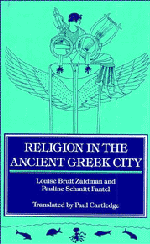Book contents
- Frontmatter
- Contents
- List of illustrations
- Author's preface to the English translation
- Translator's introduction
- List of sources
- PART I Introduction: How should we study Greek civic religion?
- PART II Cult-practices
- 4 Rituals
- 5 Religious personnel
- 6 Places of cult
- 7 Rites of passage
- 8 Settings of religious life
- 9 Religion and political life
- 10 The festival system: the Athenian case
- 11 The Panhellenic cults
- PART III Systems for representing the divine
- PART IV Envoi
- Appendixes
- Bibliography
- Index
10 - The festival system: the Athenian case
Published online by Cambridge University Press: 05 June 2012
- Frontmatter
- Contents
- List of illustrations
- Author's preface to the English translation
- Translator's introduction
- List of sources
- PART I Introduction: How should we study Greek civic religion?
- PART II Cult-practices
- 4 Rituals
- 5 Religious personnel
- 6 Places of cult
- 7 Rites of passage
- 8 Settings of religious life
- 9 Religion and political life
- 10 The festival system: the Athenian case
- 11 The Panhellenic cults
- PART III Systems for representing the divine
- PART IV Envoi
- Appendixes
- Bibliography
- Index
Summary
SACRED CALENDARS
Festivals in honour of the gods (heortai was the most general of several words used) gave a rhythm to the political and everyday life of the city. In many cities the order of the festivals was fixed in accordance with written documents generally called sacred calendars. These were lists of festivals grouped by months of the year and days of the month. In chapter 8 we looked at some Attic deme-calendars; here we shall be concerned with the festival calendar of the Athenian state as such.
This calendar, in the form in which we know it in the Classical period, dated from the time of Solon (early sixth century). It was an integral part of his lawgiving. Almost two centuries later, at the very end of the fifth century, the city commissioned a certain Nikomakhos (who was exceptionally granted citizenship despite being allegedly the son of a public slave) to reduce to order the calendar of state sacrifices. The task was duly completed and the text was inscribed on a wall within the Stoa Basileios (office of the King Arkhon) in the Agora, though Nikomakhos was still prosecuted for his pains (Lysias xxx). Only fragments of this Great Calendar of Sacrifices survive, but by combining these with other sources it is possible to reconstruct a complete Athenian festival calendar month by month (Table 1), though uncertainties of detail remain; there was, however, no popular festival in Maimakterion.
- Type
- Chapter
- Information
- Religion in the Ancient Greek City , pp. 102 - 111Publisher: Cambridge University PressPrint publication year: 1992



